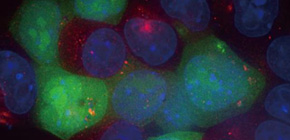
Successful development of a method for efficiently delivering foreign DNA to living cells
Will contribute to gene therapy for curing cancer, hypertension, and diabetes
In the field of molecular cell biology, where efficient transfer of genetic material to the nucleus is necessary, poor efficiency of gene delivery to cells has been an issue. And in treatment of infectious diseases caused by bacteria and viruses, how these bacterial and viral genes are processed in the affected cells has not been clarified. Furthermore, in the field of gene therapy, the development of technology for safe and efficient gene delivery to the nucleus has been sought after.
The Advanced ICT Research Institute of the National Institute of Information and Communications Technology (NICT) developed technology for incorporating artificial micrometer-sized DNA beads into living cells. In cooperation with Osaka University, The Advanced ICT Research Institute has evaluated the efficiency of gene delivery to living cells by tracking the process of autophagy in various animal cells with a fluorescent microscope.
Together with Specially Appointed Associate Professor OGAWA Hidesato and Professor HIRAOKA Yasushi at the Graduate School of Frontier Biosciences, Osaka University, this institute succeeded in increasing the efficiency of gene delivery to cells by reducing the amount of a protein called p62.
The reason for the poor efficiency of delivery of foreign genes to living cells is autophagy, a cellular defense mechanism to degrade foreign materials that have invaded cells. Because of this system, most of the incorporated genes are degraded before being delivered to the nucleus. This group proved that the removal of p62, which plays a role in the autophagy system and contributes to degradation of genes, weakened the autophagy function in cells and prevented degradation of genes, drastically enhancing the efficiency of gene delivery.
This group’s achievement will become a great breakthrough as fundamental technology in the field of molecular cell biology. It is hoped that this will contribute to the development of fundamental medicine using ES cells as well as gene therapy for specific genetic diseases such as cancer, hypertension, and diabetes.
Abstract
Novel methods that increase the efficiency of gene delivery to cells will have many useful applications. Here, we report a simple approach involving depletion of p62/SQSTM1 to enhance the efficiency of gene delivery. The efficiency of reporter gene delivery was remarkably higher in p62-knockout murine embryonic fibroblast (MEF) cells compared with normal MEF cells. This higher efficiency was partially attenuated by ectopic expression of p62. Furthermore, siRNA-mediated knockdown of p62 clearly increased the efficiency of transfection of murine embryonic stem (mES) cells and human HeLa cells. These data indicate that p62 acts as a key regulator of gene delivery.
Gene-transferred embryonic stem cells (green)
Autophagy
Gene transfer
Figure 1
Figure 2
Figure 3
Figure 4
To learn more about this research, please view the full research report entitled “ Depletion of autophagy receptor p62/SQSTM1 enhances the efficiency of gene delivery in mammalian cells ” at this page of the FEBS Letters website.
Related link
